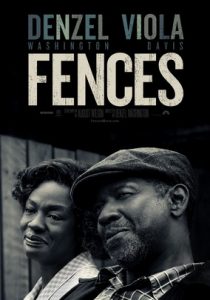Fences-2016
Director Denzel Washington
Starring Denzel Washington, Viola Davis, Jovan Adepo
Scott’s Review #652
Reviewed June 11, 2017
Grade: B+
Denzel Washington and Viola Davis both give dynamic performances in Fences (2016), a film directed by Washington himself and based on a stage play written by August Wilson.
The film reunites several actors from the stage version, and while compelling, Fences does not translate as well onto the screen as hoped. Throughout the movie, I surmised how much better Fences would be on the live stage.
Still, a tremendous acting tour de force transpires, which is well worth the price of admission.
Set in 1950s Pittsburgh, Troy Maxson (Washington) is a struggling fifty-three-year-old black man who works as a trash collector alongside his best friend, Jim Bono.
Troy is married to Rose (Davis). They have a teenage son, Cory (Jovan Adepo), an aspiring high school football player. Troy’s younger brother, a mentally impaired World War II veteran, and Troy’s older son, Lyons, a fledgling musician, are also in the mix.
Everyone lives in a close-knit community, and there is a sense of comradery, though the principal characters are frequently at odds with each other as dramatic situations slowly arise.
Troy is an irate man, frequently going on rants about his time playing in the Negro baseball league and complaining about the unfairness of the world, specifically the racial injustice of the time.
The friction between Troy and Cory is thick. Cory wants to dedicate his life to football, while Troy feels his son will ultimately be disappointed. When Troy drops a startling bomb on Rose, their lives are forever changed, and they work to mend the damage inflicted between them.
At its core, Fences is a family drama, and the story offers conflict. Almost all the action is set in the Maxson family home, a two-story brick house. Scenes frequently play out in the backyard.
The film stays very true to its roots as a stage production, which is good and evil.
The film feels like a play, so I fantasized about how good the production would be on the stage rather than on the screen, especially since some actors (Washington and Davis) starred in that version.
What a blessing and a curse.
The film feels limiting and has a glossy “Hollywood look.” This is good, but the stage version would undoubtedly be more bare-bones, giving the production a raw feel, substantial in several key dramatic scenes between Troy and Rose.
Despite other opinions, I did not find Troy to be a likable character. Washington infuses power and good acting grit into the character, but I found few redeeming qualities. To say nothing of the situation with Rose, he does not treat his son Cory with much respect.
After a while, I found Troy’s repeated verbal rampages and stories irritating and wondered, “Why should we root for this man?”
Viola Davis deserved the Best Supporting Actress award she received for her turn as Rose. Dutiful, loving, and woefully underappreciated, her character rises well above a traditional homemaker, as during one pivotal scene, she explodes with rage.
Davis, a fantastic “crier”, saves her best tears, in a weepy portrayal. But more than that, she exudes a strong woman during a time when black women had it particularly tough.
I would have preferred an edgier film than Fences (2016) brings to the big screen, but the excellent performances more than compensate for what the film otherwise lacks in darkness.
Sometimes, it is too safe and slightly watered down; the stage version may be the best option.
Oscar Nominations: 1 win- Best Picture, Best Actor-Denzel Washington, Best Supporting Actress-Viola Davis (won), Best Adapted Screenplay
